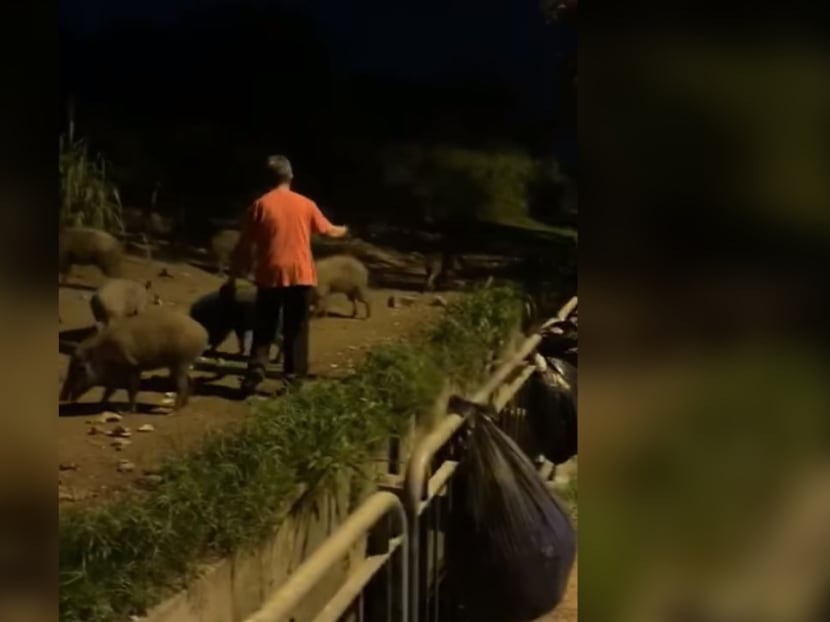9 people caught feeding, watching wild boars to be fined for breaching circuit breaker rules: NParks
SINGAPORE — A man filmed feeding a sounder of wild boars along Lorong Halus was caught by the National Parks Board (NParks) during an operation over the weekend and will be fined for breaching the Covid-19 (Temporary Measures) Act.

A two-minute video of a man feeding wild boars was circulating on social media over the weekend.
SINGAPORE — A man filmed feeding a sounder of wild boars along Lorong Halus was caught by the National Parks Board (NParks) during an operation over the weekend and will be fined for breaching the Covid-19 (Temporary Measures) Act.
In response to TODAY’s queries about a video circulating of the man, NParks said on Monday (April 20) that they had conducted an operation at Lorong Halus, which is bordered by Pasir Ris Farmway 3 and Pasir Ris Coast Industrial Park 6, where the video was filmed.
A total of nine people were caught feeding or watching the wild boars and this includes the man and two others who are believed to have been in the video, said Dr Adrian Loo, NPark’s group director of wildlife management.
The other six were caught on separate occasions during the same operation, added NParks.
The individuals will be fined for carrying out non-essential activities or gathering at the site despite being from different households.
While the video was not dated, it was shared by the Facebook group Our Singapore and by several other Facebook pages on Saturday.
In the clip that is about two minutes long, a man is seen surrounded by dozens of wild boars as he empties several large bags of food to feed the native mammals, which can weigh up to 100kg each.
As he empties the bags, more bags are thrown towards him from the side of the road where a van, bearing the logo of courier company Lalamove, can be seen.
In response to TODAY’s queries, Mr Lionel Lim, Lalamove’s marketing lead, clarified that the van was not registered on its platform and the owner of the vehicle is not one of its freelance drivers.
He said the Lalamove sticker seen in the video was part of its vehicle decal advertising campaign.
FEEDING ALTERS BALANCE OF ECOSYSTEM
Dr Loo reminded the public not to feed wildlife, including wild boars, because it can have “adverse effects on humans, the animals, and the balance of the ecosystem”.
“Feeding alters the natural behaviour of wildlife and it will make them reliant on humans for food,” explained Dr Loo.
“In turn, they may associate humans as food providers and have an increased propensity to approach humans.”
He stressed that this may lead to the animals “displaying aggressive behaviour” towards people or venturing into urban areas in search of human sources of food.
They could even pose a danger to motorists and themselves by wandering onto the roads.
Aside from causing health issues to the animals when they eat human food that is not suitable for them, wildlife will also lose their natural foraging skills and “struggle to survive” when there is no readily available food source, said Dr Loo.
“Furthermore, many animals fulfil ecological roles such as pollinators and seed dispersers, and these processes may be disrupted when they rely on humans for food instead.”
The population and distribution of wildlife is regulated through the resources available in the natural environment, he said.
Such feeding will cause an artificial increase in food, which may result in an “unnatural and unsustainable increase in populations”.
“This action contributes to increased human-wildlife conflict and also upsets the ecological balance,” he warned.
On March 25, amendments to the Wild Animals and Birds Act (Waba), now called the Wildlife Act, were passed in Parliament and are expected to come into force later this year.
First tabled in Parliament on March 6 by Nee Soon Group Representation Constituency Member of Parliament Louis Ng, the changes make it illegal to feed or release wildlife in Singapore.
First-time offenders caught feeding wildlife could be fined up to S$5,000, and repeat offenders could be fined up to S$10,000.








